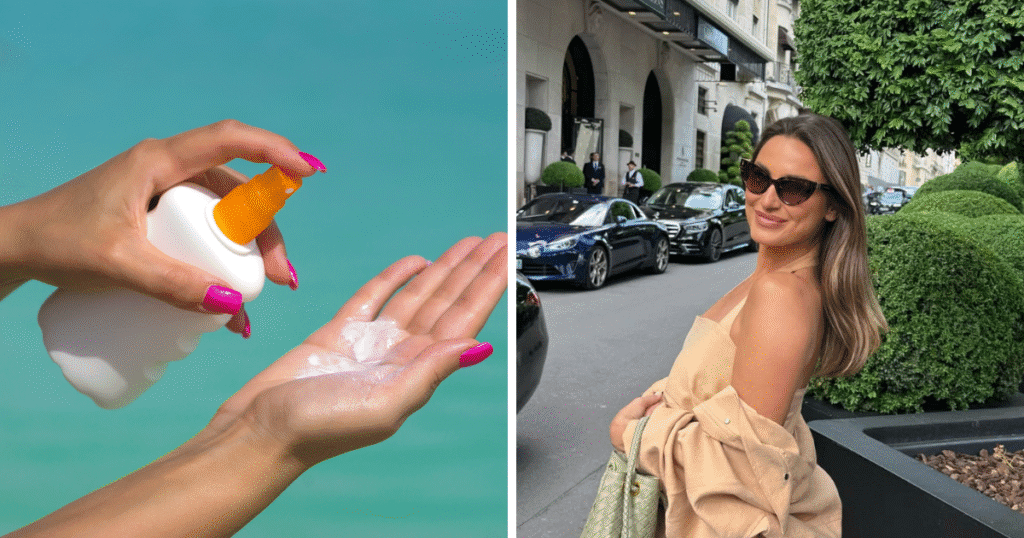The Rise of the Anti-Sun Cream Movement: A Social Media Controversy
This summer, sun cream has evolved from a mundane necessity into a topic of heated debate across social media platforms, particularly TikTok and Instagram. The anti-sun cream movement seems to have taken a stronghold, sparking discussions among everyday people and influencers alike.
Influencer Impact: SPF-Free Lifestyles
It all began when various influencers casually promoted their sun care habits, notably abstaining from sunscreen. Former “The Only Way Is Essex” star Sam Faiers shared with her 2.5 million Instagram followers that neither she nor her children wear sunscreen. Instead, she claims that her family has built up a “tolerance” to the sun.
In her Instagram story, she stated:
“Me and my whole family don’t actually wear sunscreen. Over the years, the kids have built up a really good tolerance to being in the sun. I love letting the kids run around and soak it up. It’s good for them.”
Following suit, influencer Nara Smith introduced a homemade “organic” sun cream for her children, made with beeswax and a mixture of unspecified ingredients.
The Dangers of Disinformation
The concerning reality is that these perspectives are resonating with many young people. Recent studies indicate that Gen Z is particularly susceptible to misconceptions about sunscreen. Here are some alarming statistics:
- Nearly 30% of young adults prioritize getting a tan over skin protection.
- More than one-third only apply sunscreen when reminded.
- Approximately 20% believe that tanning renders sun protection unnecessary.
Expert Opinions: Debunking Myths
Medical professionals are voicing serious concerns regarding this trend. Specialists emphasize that skin does not “get used to” sunlight, and a tan serves merely as an indicator of DNA damage. According to the NHS, even a basic tan offers minimal protection, far below the recommended SPF 30. Neglecting sunscreen can significantly increase the risk of:
- Sunburn
- Premature aging
- Skin cancer
Insights from Dermatologists
-
Professor Firas Al Niaimi warns:
“The amount of sunlight required to get vitamin D is minimal and does not necessitate abandoning sunscreen.”
-
Dr. Sina Ghadiri adds:
“Claims that sunscreen causes skin or hormonal disruption lack robust evidence, while the cumulative risk of skin cancer is a far greater concern.”
The Effectiveness of Homemade Sunscreens
DIY sun-care recipes gained popularity on social media, with ingredients like coconut oil, shea butter, and beeswax being touted as alternatives. However, dermatologists caution that these homemade mixtures do not reliably block UV rays. They often result in uneven application and provide insufficient protection.
Understanding the Shift in Attitudes Towards Sunscreen
So, why has sunscreen come under fire? Several factors contribute to this skepticism:
-
Pandemic-Era Mistrust: Increased distrust in conventional medicine during the pandemic has led some to question established health guidelines.
-
Clean and Natural Trends: The online obsession with “clean” and “natural” products often vilifies chemical-based solutions, regardless of their effectiveness.
-
Influencer Misinformation: The virality of catchy yet scientifically inaccurate posts compounds the issue, persuading more young people to forego sunscreen based on trends rather than facts.
Conclusion: Prioritize Skin Protection
As the summer unfolds, it’s vital for individuals, especially the youth, to navigate the noise and misinformation regarding sun care. Relying on TikTok trends over scientific evidence can have serious repercussions for skin health.
To learn more about protecting your skin, consider reputable sources like the NHS and consult with healthcare professionals who can provide evidence-based advice.
For ongoing discussions about skin health and preventing sun damage, stay informed and prioritize your well-being!


